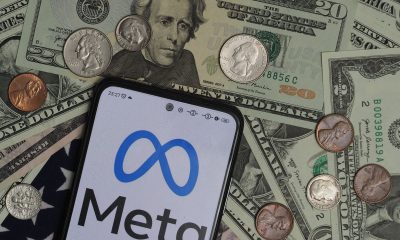Investing
New ECB rating agency Scope puts greater weight on euro zone protection mechanisms

© Reuters. FILE PHOTO: A Greek flag flutters atop the Panathenean stadium as the Acropolis hill is seen in the background in Athens April 11, 2014. REUTERS/Yorgos Karahalis/File Photo
By Marc Jones
LONDON (Reuters) -Scope, Europe’s first ECB-approved credit ratings agency, promises to put more weight on the euro zone’s improved ability to navigate crises although it has concerns about Italy and France and warns the Dutch election result could trouble its coveted triple-A grade.
By joining a soon-to-be-five-member group that the European Central Bank uses to judge government bond collateral values, Berlin-based Scope could play a significant role in any future financial market crisis.
It also fulfils an ambition held by policymakers for a domestic player since the height of the bloc’s debt troubles 15 years ago, when mass downgrades by U.S. agencies like S&P and Moody’s (NYSE:) were openly blamed for stoking the turmoil.
Scope says its European roots give it a native appreciation of the way the euro area has tooled itself up, part of the reason it became the first agency to restore the investment-grade rating of financial-crisis poster child Greece.
“One of our distinguishing characteristics … is that we emphasise the multiple improvements in Europe’s institutional set-up,” said Scope’s top sovereign analyst, Dennis Shen, when asked how the agency assigns ratings compared with S&P, Moody’s, Fitch and DBRS Morningstar – the other firms on the ECB’s list.
“We take such institutional enhancements very seriously,” Shen told Reuters in the firm’s first in-depth interview since winning the ECB’s approval earlier this month, citing an example of how COVID-related support measures would outlast the pandemic.
While the euro zone has pledged to do “whatever it takes” and jointly issued debt for the first time during the pandemic, its debt load remains eye-watering.
Italy, France, Spain, Portugal, Belgium and Greece all have debt-to-GDP ratios well above 100% while Cyprus, Ireland and Luxembourg and the only euro zone members expected to be spending a smaller share of their tax revenue servicing debt interest payments in five years’ time.
For Italy that figure is forecast to be nearly 10% by 2028. Scope assigns Italy a “stable” outlook, but “risks remain,” Shen said, “given the weak growth and fiscal outlook”.
It is also one of the countries that could be caught by the European Union’s excessive deficit procedure (EDP) in coming years, which would technically prevent the ECB from using its crisis-fighting Transmission Protection Instrument (TPI) if markets turn on Rome again.
“Italy will be vulnerable if it finds itself in an adverse scenario in which yields rise again and markets are not certain whether debt is going to be eligible for any ECB intervention,” Shen said.
NEXT CRISIS
The ECB uses the best rating available from its approved agencies to determine a bond’s collateral value when commercial banks borrow from it.
A 3-tiered system assigns an AAA to A- rated bond around 5% more worth that one graded BBB+ to BBB-, while anything below that is ineligible unless the ECB bends the rules.
During the euro zone crisis Canada-based DBRS offered Italy a lifeline by holding its rating at A- for far longer than S&P, Moody’s and Fitch, so the country’s government bonds maintained maximum collateral value at a crucial time.
Scope, which has fewer than a dozen sovereign analysts, has also recently lifted Portugal to A- but effectively warned that France’s AA rating could be downgraded by assigning it a negative outlook.
“The finance ministry has been taking measures – that does have some (favourable) impact on the debt trajectory, especially if this is accompanied by stronger growth,” said Shen, still forecasting France’s debt to hit 112% of GDP by 2028.
That may not bode well for any future crisis when borrowing levels could jump again, and given the current inflationary environment would be expected to help erode debt.
Last week’s Dutch election win by the far-right Geert Wilders could also have rating implications, Shen said.
“Governance risks are a challenge in the longer run for one of the world’s remaining AAA-rated sovereigns … But the rating is not imminently at risk.”
Read the full article here

-

 Side Hustles7 days ago
Side Hustles7 days agoMicrosoft Is About to Begin Job Cuts. Here’s Why.
-

 Make Money6 days ago
Make Money6 days ago10 Critical Questions to Ask Your Financial Advisor Now
-

 Make Money5 days ago
Make Money5 days ago10 Ways to Make Money As a Graphic Designer
-

 Personal Finance4 days ago
Personal Finance4 days agoIf you are 60 years old, new 401(k) rules could save you money
-

 Investing7 days ago
Investing7 days agoWhat CMOs Need to Know About AI Adoption in Marketing Teams
-

 Investing5 days ago
Investing5 days agoCould Easier Cancellations Build Customer Loyalty?
-

 Investing6 days ago
Investing6 days agoAirbus keeps top spot with 766 jet deliveries in 2024 By Reuters
-

 Side Hustles7 days ago
Side Hustles7 days agoJPMorgan to Implement a Five-Day Return-to-Office Mandate


















